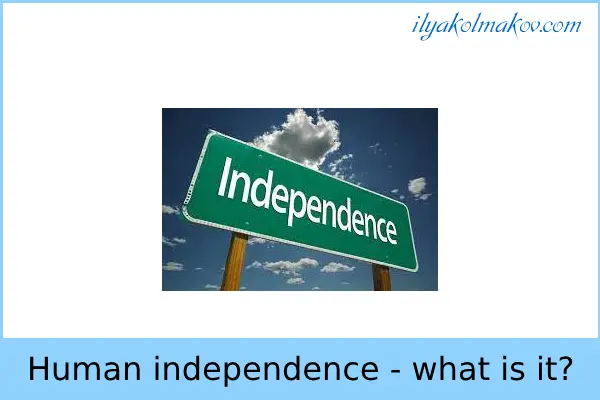
I would like to talk about the independence of a person, more precisely about independence in the personal sense of the word.
The fact is that a person is conditioned by addictions, and there is no escape from this, and it is pointless to try to be independent. I mean independence as a human need in connection with oneself. That is, it is not a denial of conditioning; on the contrary, it is a consequence of an absolute and unconditional understanding of this conditioning.
It seems strange to me, at this stage of my individual development, how, for example, I would depend on a certain person, for example, in the person of a beloved woman. For me, the very fact of relationships that you need and that serve as part of your own identity is no longer acceptable, but not because I avoid them as such, but the very fact of psychological dependence on anyone causes an intuitive rejection.
Be that as it may, relationships are already an addiction, but this does not mean that they, in principle, should be avoided, since they are quite natural at certain stages of life. I'm not talking about avoiding anything at all. I do not oppose some kind of seclusion to relationships, since a person who has chosen the path of self-knowledge through honesty with himself, in principle, cannot oppose anything to his path, because this is his personal path chosen by him, but this is not the path of isolation. What do you feel after break up.
Honesty with oneself cannot isolate him from people or make him less adaptable in society, since the discoveries that he makes in himself allow him to understand people better than if he were constantly with them. But this does not mean that a person does not need to be with anyone at all. A person can derive some practical benefit from a relationship for himself if for him these relationships are a kind of way of self-expression, but not a way of avoiding himself.
When a loved one dies
When, say, a loved one dies, the lover becomes discouraged because he identified the fullness of his life with his loved one. And he reacts, in connection with the death of his beloved, accordingly. In his perception, he seems to lose a part of himself. He needs that person because he saw him as part of himself.
Although initially people cannot be part of each other, because they are individual in the sense that they are created from a unique combination of factors. Therefore, the phenomenon when someone does not cry after the death of a loved one does not mean his insensitivity, but simply says that he does not perceive the beloved as part of himself. I don't mean cases where people aim at the death of another in order to take possession of his property.
In fact, the death of another person, by definition, cannot have any effect on him, because it was not he who died, but the person who caused him to associate as part of himself. And he is sad, in fact, not about the death of a person as such, but about the death of a part of himself simply because he is not the one who died.